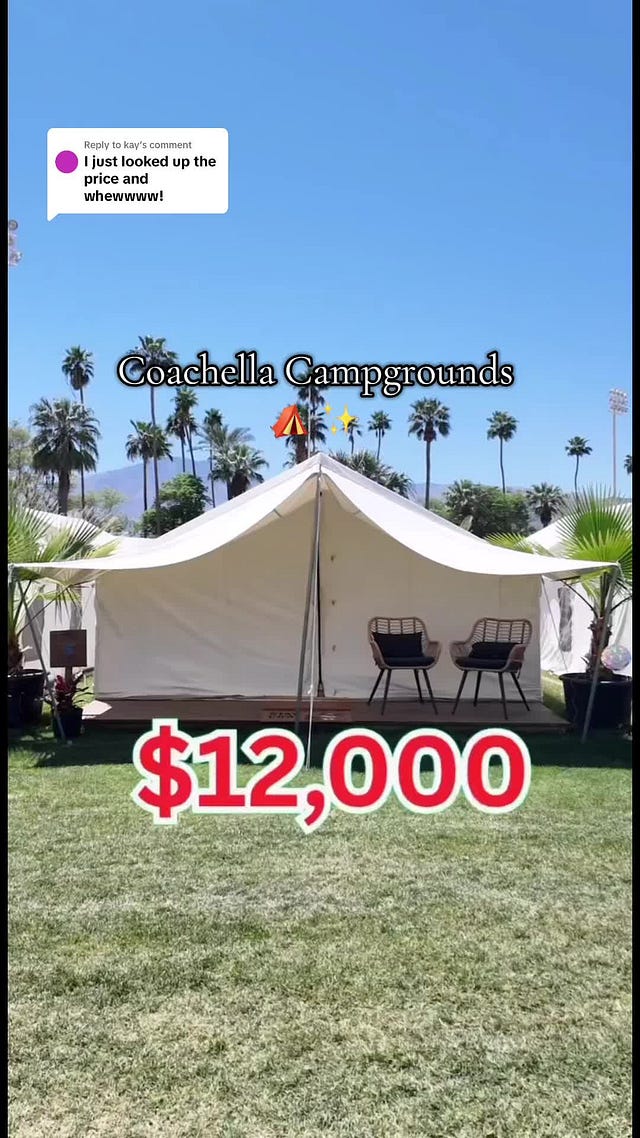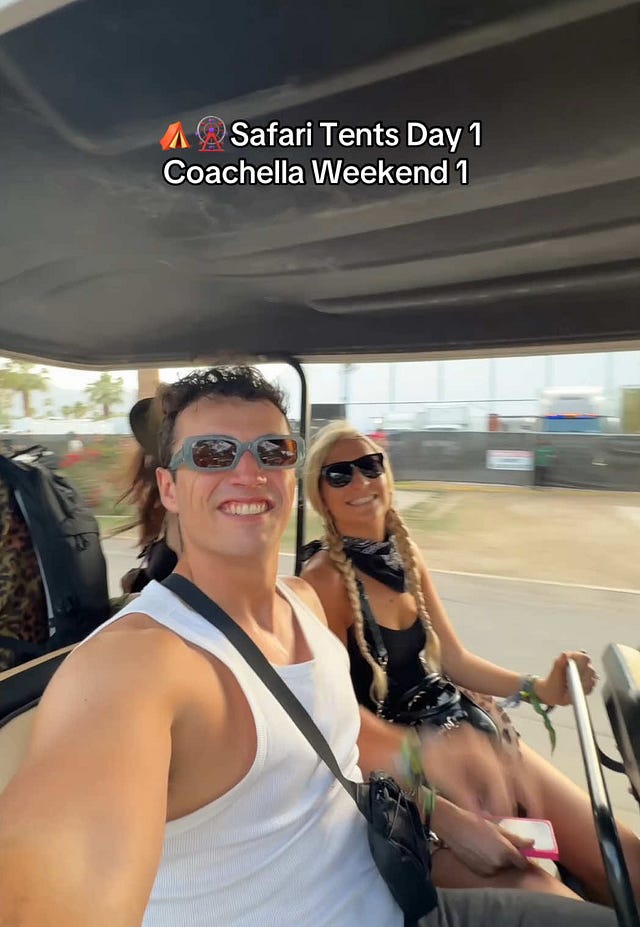Capitalism, But Make It Camp: Coachella and Conspicuous Camping
Do you want to go to Coachella, or just talk about it from the comfort of your bed?
This is a free post for subscribers of Landline, a pop culture and history newsletter for people who care about the Titanic, and the Kate Winslet vehicle of the same name. Consider subscribing to the paid plan to get my weekly email of recommendations and links, a podcast episode, and more! You can also help me spread the word by sharing it with a friend who would love it.
Over the weekend, I was once again reminded it’s Coachella season. I have never attempted to attend this festival myself, mostly because I love myself and air conditioning.
That said, it’s been host to some historic moments: Beychella; the Insecure episode when Kelly gets tazed by security, thereby missing Beychella; and an archive of great music moments.
The thing that really strikes me this year, in a time that is trying my soul, is how nakedly the event reflects the stark divide between rich and non-rich in our country right now. Before I get into where and how we see these differences, let’s just start with the fact that ticket prices for weekend attendance alone (no accommodation, food, etc.) start at $649 (for weekend 1). Because the festival takes place in a literal desert, temps are already pushing 100 degrees. I can’t fathom paying to be fried alive in a dustbowl. But then again, I’ve never been considered an arbiter of taste.
What blew my mind over the weekend was Coachellatok, or the creators at the festival sharing varying levels of accommodation, pricing, and the corresponding level of hell each creates.
How did I get here? I was scrolling my life away on Friday, when I started stumbling on videos like those of @_devanity showing her car camping experience (a journey I followed all weekend): First, it took her over 6 hours to get to the site because lines were so long at the entrance. (It would be a wrap for me at this point.) She continued her quest and survived day 1 (comparing her in my head to the kind of character I had to write essays about in AP Lit). However, she woke up with a cough because she slept outside in the desert next to her car.
 Tiktok failed to load.
Tiktok failed to load.Enable 3rd party cookies or use another browser
In the comments of another video, she said she was thinking of leaving to get a hotel room, but shared that it would cost her $2000 (!)
Besides the dustbowl history, I started to notice that people’s experiences were very different based on how much you’d be willing to pay for your experience. Here are some pricier options:
 Tiktok failed to load.
Tiktok failed to load.Enable 3rd party cookies or use another browser
I know I’m gay because I saw this and thought, “But I could buy a Subaru for that!”
Some of these folks shared the wealth (not literally) by sharing their pricier experience in the *checks notes* “safari tents”:
Safari tents come with AC, golf cart transportation to the stages, catered meals, and more. This sets you back roughly $3k/person. Frankly, all camping options are not cheap (car camping is $160 + admission, making it the least expensive option).
Watching videos that could have been b-roll in a disaster film, I kept wondering, what is up with people wanting to pay so much to be treated so badly? Or, as a TikTok prophet I love, @dutcheccc said:
“It’s diabolical to me the way people with money will spend money to feel like they don’t have money.”
This is exactly right. Because I have history deep in my brain, I also know this is a trend we’ve seen before and will see again.
First, never forget the entire idea for vacation came from rich people who wanted to escape from work they weren’t doing. With the proliferation of railroads, the rich in the nineteenth century could travel farther from home more easily and started to popularize locations with enviable climates year-round. The New York Times had a society column that told readers where the rich in the city travelled, which is how we know they liked the cooler New England sea air in the summer and retreats like Palm Beach in the winter. Not seeking wholly different experiences in these places, they would build themselves 20,000 square foot “cottages” in places like Newport, Rhode Island, and continue to host ultra-exclusive balls, teas, and tennis parties.
It’s in our social lives that we often reveal ourselves. In the case of Gilded Age stockbroker Henry Clews and his wife, it was through their choice of party theme. During a Newport, Rhode Island season, they wanted to throw a party that would show they weren’t like the other girls. Their theme? Dress up as servants! Their “Servants' Ball” invited their fellow rich friends to come in costume as “the help.” According to accounts of the ball, guests arrived in tailored, expensive costumes meant to look like rags and proceeded to do service worker cosplay. The hostess met guests at the door dressed as a maid and holding a feather duster. Some guests barged into the kitchen to make their own dinner and ate seated on wooden boxes, the fine dining chairs having been removed from the table to fit with the theme. What fun!
Nothing says “off with their heads” like rich people doing poor people cosplay. Just ask Marie- Antoinette, who herself built a Hamlet, or “peasant village” on the grounds of Versailles where she could escape and relax by pretending to be a poor shepherdess. (You can take a virtual tour of it here.)
Marie-Antoinette’s Hamlet Source
Others, like Teddy Roosevelt, didn’t cosplay as poor, but he did pay a lot of money to look like a working man while on vacation. Mourning the loss of his wife and mother (who died in the same house on the same day), he dumped his daughter with his sister and headed west to grieve via cowboy cosplay. In a suit designed by Brooks Brothers, he may as well have been prepping for Coachella with the curated energy he put into his embrace of casual “work wear.” Returning to nature from New York society, he grieved by embracing the masculine “roughing it” culture of ranch work. This was not unique to Roosevelt, as camping developed in part to give respite to city dwellers seeking a return to nature and provided men “overcivilized” (read: emasculated) by technology and urban life the chance to embrace the masculinity of hunting, fishing, and outdoor life.
With Tiffany-carved knife and rifle. 1885. Source
Before you tell yourself it sounds insane to engage the equation: western culture| camping + man = masculinity, consider the appeal of Yellowstone in recent years and this comment on an influencer’s tour of his “western-themed” tent at Coachella.
Babe, I got news for you, we’re currently in a trade war that is going to feel as real to your bank account as Tom Hanks’ lingering looks in Saving Private Ryan. Also, grow up! Maybe this commentator is just upset that we let *some* women go to space this week in another stunning display of “if you can afford it, no one will stop you!” If it’s any consolation to him, actual women working at NASA are being laid off and having their histories pulled from the official website, but I digress.
Paying a lot to “rough it” is obviously not new, but what are we to make of it?
Rich people are doing this because they can. I will never understand how the extremely wealthy spend their time and money, but then again, I don’t have to.
More concerning is the percentage of working people who literally went into debt to afford their general admission Coachella tickets. When Coachella first offered payment plans for general admission tickets in 2009, only 18 percent of attendees used them. This may be in part because, at that time, a three-day pass cost $269 before fees. In 2025, a reported 60 percent used payment plans.
In an even more surreal twist, Bernie Sanders addressed the crowd at Coachella on the threat of Donald Trump. These fears are real. It’s also true that this “roughing it” cosplay was also made possible by the greed of organizers who charge this much and create these conditions for attendees simply because they know they can. Why else would we consent to pay $17 for a watery lemonade? Or wait up to 12 hours to set up a truly sad car camping site?
Ironically, the Coachella festival began with a concert Pearl Jam played in the area in 1993. They’d chosen the site because they wanted to protest the fees charged by Ticketmaster at area venues.
As we approach weekend 2 of Coachella, I wonder if we’ll see any pushback or crisis PR from organizers to make conditions seem less bleak. For example, will we see more stories about how thrilled the public is that there is a free live YouTube stream? I will be watching the videos people share and imagining how future historians will see these as relics of our time. What stories do they tell?
Call Me! (or not!)
I’d love to hear from you! Drop your thoughts in the comments to share with the Landline community, or reply to this email to contact me. You can also find me on Instagram, or email me. I don’t have a dedicated phone line yet (just like in my youth), but maybe someday I’ll achieve Claudia status and get a Landline.
Thanks for reading!
This is a free post for subscribers of Landline. Consider subscribing to the paid plan to get my weekly email of recommendations and links, a podcast episode, and more! You can also help me spread the word by sharing it with a friend who would love it. Thank you for being a friend!
Note: All books referenced in Landline can be found in my bookshop.org storefront from which I earn a small percentage of all books purchased.












love this. biggest takeaway: I mistakenly thought I would be free from coachella propaganda for at least another year, only to get to the end of this post and realize I must endure it for a second weekend :(